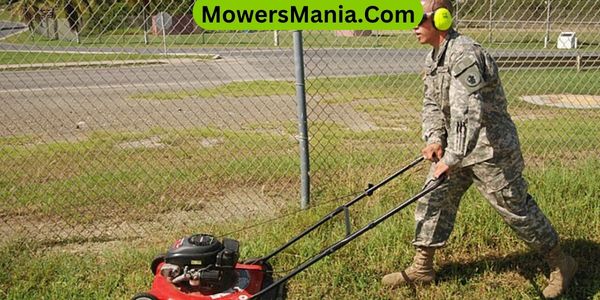Do you ever wonder if wearing earplugs while mowing the lawn is really necessary? You might have heard conflicting opinions on this topic, but the truth is, the potential risks of noise exposure during lawn mowing are worth considering.
With the constant roar of the mower engine, it’s essential to understand the impact it can have on your hearing.

But before you dismiss the idea of ear protection, there are some important factors to consider that could significantly impact your decision.
Importance of Ear Protection
When operating loud equipment like lawn mowers, it’s crucial to wear ear protection to prevent potential hearing damage.
The noise generated by a typical gas-powered lawn mower can reach up to 100 decibels, which is well above the safe threshold for prolonged exposure. Without ear protection, this level of noise can lead to irreversible hearing loss over time.
Even short-term exposure to such high noise levels can cause temporary hearing impairment or tinnitus, a ringing sensation in the ears.
By wearing earplugs or earmuffs while mowing the lawn, you can significantly reduce the risk of damaging your hearing.
It’s important to choose the right type of ear protection for mowing the lawn. Disposable foam earplugs are a cost-effective option that provides a good seal in the ear canal, effectively blocking out the loud noise of the mower.
If you prefer earmuffs, make sure they’ve a high noise reduction rating (NRR) to adequately protect your ears.
Remember that protecting your hearing while mowing the lawn is essential for maintaining your long-term auditory health.
Risks of Noise Exposure
Protecting your ears from excessive noise exposure is crucial for preventing long-term hearing damage.
When mowing the lawn, the noise from a typical gas-powered lawnmower can reach up to 90 decibels (dB), which is well above the recommended safe limit of 85 dB for prolonged exposure.
Prolonged or repeated exposure to such high levels of noise can lead to various risks for your hearing health.
Here are some potential risks of noise exposure:
| Risk of Noise Exposure | Description |
|---|---|
| Hearing Loss | Long-term exposure to loud noises can lead to permanent damage to the sensitive hair cells in the inner ear, resulting in hearing loss. |
| Tinnitus | Exposure to loud noises can cause a persistent ringing, buzzing, or hissing in the ears known as tinnitus, which can be distressing and affect your quality of life. |
| Increased Stress | Constant exposure to loud noise can lead to increased stress levels, impacting overall well-being and mental health. |
| Interference with Communication | Exposure to excessive noise can make it difficult to hear and understand speech, leading to communication challenges in various settings. |
Understanding the risks associated with noise exposure highlights the importance of using ear protection, such as earplugs, when operating loud machinery like lawnmowers.
Benefits of Wearing Earplugs

Using earplugs while mowing the lawn can provide several benefits for protecting your hearing health.
First and foremost, wearing earplugs can significantly reduce the risk of hearing damage caused by prolonged exposure to the loud noise of a lawnmower. This is particularly important because noise-induced hearing loss is irreversible, making prevention crucial.
By wearing earplugs, you create a barrier that reduces the amount of sound reaching your eardrums, thus safeguarding your hearing.
Additionally, wearing earplugs can help prevent the development of tinnitus, a condition characterized by ringing, buzzing, or roaring sounds in the ears. Tinnitus can be triggered by exposure to loud noises over time, and using earplugs can mitigate this risk.
Furthermore, earplugs can improve your overall mowing experience by reducing fatigue and stress that can result from prolonged exposure to the loud noise of the lawnmower.
By protecting your hearing and enhancing your comfort, earplugs are a simple yet effective tool for promoting a safer and more pleasant mowing experience.
Types of Ear Protection
When choosing ear protection for lawn mowing, you have a few options to consider.
Foam and silicone earplugs are popular choices for their comfort and affordability.
Electronic noise-canceling earmuffs are also a great option for those who want to block out noise while still being able to hear important sounds.
Foam Vs. Silicone
For optimal ear protection while mowing the lawn, consider the differences between foam and silicone earplugs. Both types offer advantages, so choose the one that best suits your needs.
Here’s a quick comparison to help you decide:
Foam Earplugs
- Provide excellent noise reduction, making them ideal for loud environments.
- Comfortable to wear for extended periods due to their soft and malleable texture.
- Disposable and cost-effective, making them convenient for regular lawn maintenance.
Silicone Earplugs
- Reusable and durable, offering long-term cost savings and environmental benefits.
- Moldable to fit your ear canal, providing a custom and secure fit for maximum protection.
- Ideal for individuals with sensitivities, as they’re hypoallergenic and non-irritating.
Consider these factors when choosing between foam and silicone earplugs to ensure your ears are well-protected while mowing the lawn.
Electronic Noise Canceling
When considering ear protection for mowing the lawn, it’s essential to explore electronic noise canceling as another effective option for safeguarding your hearing.
Electronic noise-canceling ear protection uses advanced technology to actively block out harmful noise while still allowing you to hear important sounds such as speech or warning signals.
These devices work by using microphones to pick up external sounds and then producing an anti-noise signal to cancel them out.
This can provide a more comfortable and natural listening experience compared to traditional passive ear protection.
Electronic noise-canceling ear protection is particularly beneficial in environments with consistent or high levels of noise, such as mowing the lawn, as it can help reduce the risk of hearing damage while still allowing you to be aware of your surroundings.
Choosing the Right Earplugs
Select earplugs that provide a snug and comfortable fit to effectively reduce noise while mowing the lawn. Choosing the right earplugs is essential for protecting your hearing and making mowing more comfortable.
Here are some key factors to consider when selecting earplugs:
- Noise Reduction Rating (NRR): Look for earplugs with a high NRR, which indicates the amount of noise the earplugs can block out. A higher NRR means better protection against loud lawn mower noise.
- Comfort and Fit: Opt for earplugs made of soft, hypoallergenic material that molds to the shape of your ear canal for a secure and comfortable fit. Discomfort or pain from poorly fitting earplugs can detract from the overall mowing experience.
- Durability and Reusability: Consider earplugs that are durable and reusable, as they can save you money in the long run and reduce waste. Look for earplugs that are easy to clean and maintain for prolonged use.
Tips for Using Ear Protection

Ensure that your earplugs are inserted properly to maximize their noise-reducing effectiveness while using power tools like lawn mowers.
Start by rolling or pulling your earlobe gently to straighten the ear canal. Then, insert the earplug and hold it in place while it expands to create a snug fit.
Check that the earplugs are securely in place and not protruding from your ears.
Additionally, consider using earmuffs in conjunction with earplugs for extra protection, especially when operating particularly loud equipment. When using earmuffs, ensure that they completely cover your ears and form a tight seal.
It’s important to regularly inspect your ear protection for any signs of wear or tear, and replace them as needed to maintain their effectiveness.
Remember to keep your hands clean when handling earplugs to prevent introducing dirt or bacteria into your ear canal.
Frequently Asked Questions [FAQs]
Can Wearing Earplugs While Mowing the Lawn Affect My Ability to Hear Other Sounds Around Me?
Wearing earplugs while mowing the lawn can reduce noise exposure and protect your ears. However, it’s important to use caution, as it can affect your ability to hear other sounds around you, such as approaching vehicles or people.
Are There Any Potential Health Risks Associated With Using Earplugs for Extended Periods of Time?
You might experience potential health risks from using earplugs for extended periods, such as ear infections or impacted earwax. It’s important to take breaks and practice proper earplug hygiene to minimize these risks.
How Do I Know if the Earplugs I Choose Will Provide Adequate Protection Against Lawn Mower Noise?
To ensure your earplugs offer enough protection against lawn mower noise, look for a Noise Reduction Rating (NRR) of at least 24 decibels. Make sure they fit snugly in your ears to block out sound effectively.
Are There Specific Earplug Brands or Types That Are Recommended for Lawn Mowing Activities?
When mowing the lawn, it’s recommended to use earplugs designed for high noise reduction, such as foam or silicone earplugs. Look for reputable brands like 3M, Howard Leight, or Mack’s for effective protection.
What Are Some Alternative Methods for Reducing Noise Exposure While Mowing the Lawn, Aside From Using Earplugs?
To reduce noise exposure while mowing the lawn, try using noise-canceling headphones or earmuffs. You could also opt for electric lawn mowers, which are quieter than gas-powered ones. These alternatives can help protect your hearing.
Conclusion
So, should you wear earplugs when mowing the lawn?
Yes, it’s important to protect your hearing from the risks of noise exposure. Wearing earplugs can help reduce the sound level and prevent potential damage to your ears.
Make sure to choose the right type of earplugs and use them properly to effectively protect your ears while mowing the lawn.
Your future hearing health will thank you!



